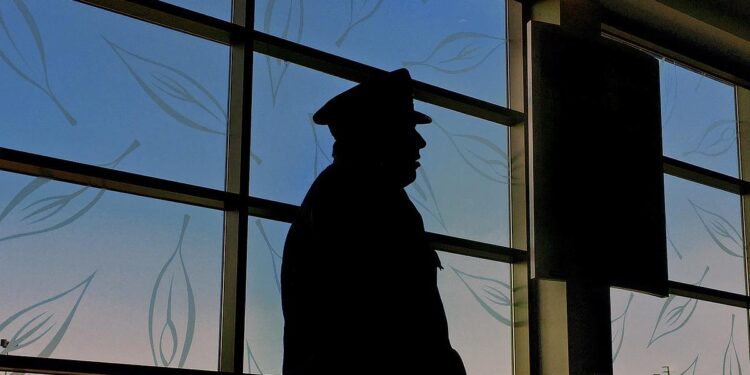This is The Marshall Project’s Closing Argument newsletter, a weekly deep dive into a key criminal justice issue. Want this delivered to your inbox? Subscribe to future newsletters.
Private security guards are present in nearly every facet of public life, from schools and hospitals to public transit agencies, and religious buildings. With the number of sworn police officers dwindling nationwide and departments struggling to attract new recruits, many businesses are turning to security guards, who outnumber police officers by a significant margin.
But security guards face far less oversight than police and have lower licensing and training standards. There’s also growing evidence that failed cops with troubling histories of abuse — including excessive force — can easily find second careers in private security.
About 30% of former police officers working as private security guards in Florida had been fired or faced complaints for serious “moral character violations” while they were officers, according to a recent academic study. The misconduct included felony crimes, excessive force or false statements in court. Some aspiring officers who couldn’t pass a basic policing test or get a job in law enforcement also turned to private security, the study found. This echoes reporting I did about 10 years ago, which found that failed officers and prison guards with histories of abuse often worked in private security.
Allowing these officers to slip into the security industry can have serious consequences, experts say. As a narcotics officer for the Detroit Police Department, Matthew Zani was accused of repeatedly violating the civil rights of people he arrested. He and seven other officers were charged criminally, but were later acquitted after jurors found the witnesses lacked credibility.
After the police department fired him, Zani became an armed guard at an office and retail complex. There, he beat and detained two Black visitors in a basement cell, according to a lawsuit filed against him and the security company he worked for. Zani and the firm are now facing multiple lawsuits alleging a pattern of racism, harassment, excessive force and false arrest by several White guards. Zani, the other guards named in the lawsuits and the security company have all denied violating anyone’s rights.
I found numerous examples of cops with histories of complaints in law enforcement becoming private security guards and then shooting and killing people. In one case, an apartment complex guard in Georgia, who had repeatedly faced complaints of racial profiling, got in a fight with one resident and fatally shot him. The guard was not charged criminally. In another case, a guard working for a public transit agency in San Diego shot and killed a man after he had been detained and laid on his stomach.
Some officers who have been fired after accusations of sexual misconduct have also landed in private security jobs that put them in close contact with the public and even children. In 2022, a former officer who had been fired for sexual misconduct involving the victim of a crime was discovered working at a high school in Arizona. And last year, Chicago Public Schools suspended two security guards after it was discovered that they were previously fired from the Chicago Police Department and on the city’s “Do-Not-Hire List.” One of the former Chicago officers had been terminated from the department in 2019, following allegations of sexual misconduct involving a minor. The other officer had faced allegations of domestic abuse.
Previous reporting has shown that many police departments are notoriously bad at disciplining their officers, and many who are fired never lose their police certification. That means they can easily jump from department to department after problems arise. These “wandering officers” are more likely than other cops to get fired again or have moral character violations, according to an academic study. In many places, it’s impossible for the public to look up whether an officer has ever been fired or lost their certification.
This is also true in the private security profession. In my previous review of state policies, most states that license security guards did not seem to care whether an applicant was a former police officer who had been fired, disciplined or decertified by a commission of peace officer standards and training (POST).
“A lot of our decision is based on that appearance of the individual,” the chairman of the Georgia licensing board told me at the time. “I would say that most of the former police officers — even if they have POST problems — most of them get licensed.”
There’s a major reason why security companies want former officers: their law enforcement training and experience are highly valued. In Florida, officers must complete more than 10 times as much training as armed security guards and pass multiple tests before they’re allowed to patrol. As a result, state regulators exempt police officers from the training requirements to become private guards, literally fast-tracking former cops into the profession.
For all the problems with police discipline, the oversight of armed guards is even worse. In my previous reporting, I found that most states did not require companies or guards to report to a state licensing agency when they shot somebody. Even when guards reported it, regulators rarely investigated the incident or rescinded a guard’s license.
The oversight is even more lax in cases that don’t involve guns. Zani, the former Detroit officer, and several of his fellow guards, had been the subject of complaints for years. In one instance, another guard saved video evidence and emailed a complaint to the state licensing agency, describing compliance violations, racial profiling and excessive force. But 18 months later a reporter found the state agency had yet to respond to the guard who made the complaint.



























